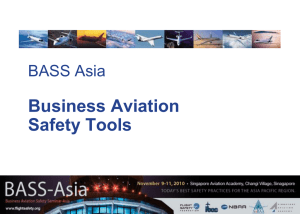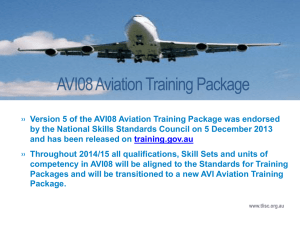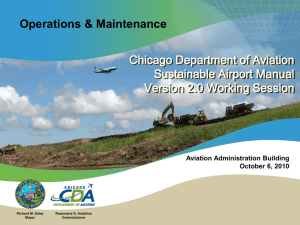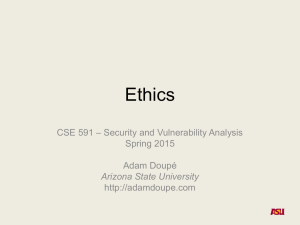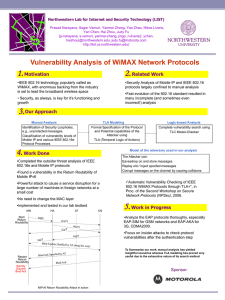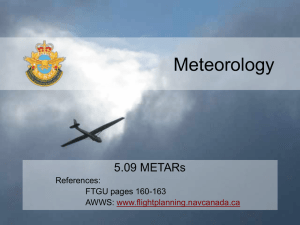Impact of climate cHange on aviation vulnerability - mowe
advertisement
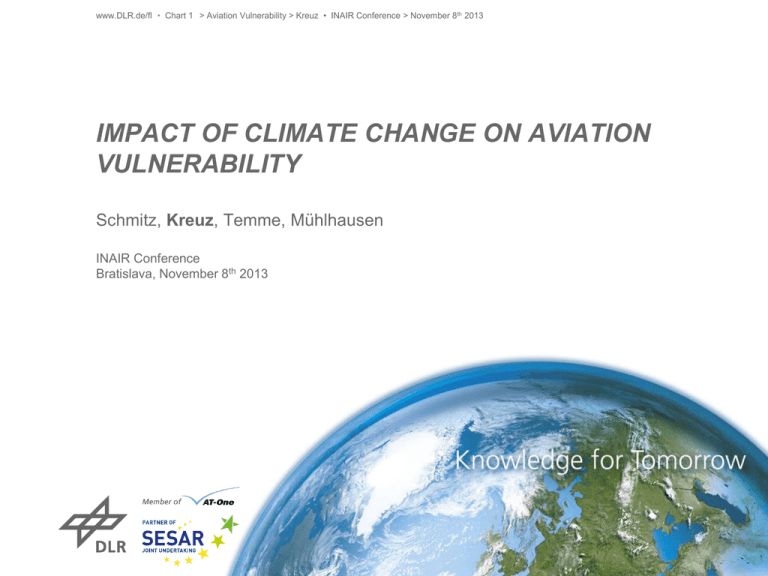
www.DLR.de/fl • Chart 1 > Aviation Vulnerability > Kreuz • INAIR Conference > November 8th 2013 IMPACT OF CLIMATE CHANGE ON AVIATION VULNERABILITY Schmitz, Kreuz, Temme, Mühlhausen INAIR Conference Bratislava, November 8th 2013 www.DLR.de/fl • Chart 2 > Aviation Vulnerability > Kreuz • INAIR Conference > November 8th 2013 Extreme weather – an aviation perspective www.DLR.de/fl • Chart 3 > Aviation Vulnerability > Kreuz • INAIR Conference > November 8th 2013 Outline - Definition of vulnerability in the ATM context - METAR weather codes by the ATM Performance Group (ATMAP) - Severe weather impacts on the ATM - Single airport (local view) - ATM European network (regional view) - Interdependencies of traffic conditions at airports and severe weather impacts - Conclusions www.DLR.de/fl • Chart 4 > Aviation Vulnerability > Kreuz • INAIR Conference > November 8th 2013 State of ATM System* Uncertainties: type, frequency, intensity, duration and time of occurrence disturbance Uncertainty: type of stress Modification of system Robustness of system ATM-System lethal stress no stress Uncertainty: type of pertubation permanent pertubation New reference state of system survival stress transient pertubation Resilience of system *as defined in (Gluchshenko 2012) www.DLR.de • Chart 5 > Aviation Vulnerability > Kreuz • INAIR Conference > November 8th 2013 Eurocontrol ATM Airport Performance (ATMAP) – Group Severity Classes assigned to METAR weather codes - METAR is a message containing all safety critical meteorological observations for flight operations in a given airport and nearby airspace (up to 16km from the airport) - ATMAP weather algorithm* assigns severity coefficients to the following weather classes (the higher the coefficient the more severe the weather event) - Visibility and Ceiling Wind Precipitations Freezing conditions Dangerous phenomena - En-Route weather events are not covered by METAR descriptions *Eurocontrol Technical Note: Algorithm to describe weather conditions at European airports – ATMAP weather algorithm Version 2.3, May 2011 www.DLR.de/fl • Chart 6 > Aviation Vulnerability > Kreuz • INAIR Conference > November 8th 2013 Elements of ATMAP-weather classes with high coefficients Weather Class Ceiling and visibility Wind Precipitations Freezing conditions Dangerous phenomena Description „Low visibility“ operations; ILS separation minima increased Impact on aircraft over ground speed; crosswind threshold Substantial equipment, complex procedures required Heavy frost conditions even for Scandinavia Dangerous for safety of aircraft operations, unpredictable impact Condition Approach CAT II - III Wind speed > 30 kts FZxx, (+)SN [T > 3°C and (+)(SH)SN, FZxxx] OR [T<= -15°C with visible moisture] [TCU, CB and cloud cover] [TCU, CB and cloud cover and (+/-) SHxx] [GS, FC, DS, SS, VA, SA, GR, PL, TS, +TS] Coefficient 4-5 4 3 4 [3-12] [4-24] [18-24] www.DLR.de/fl • Chart 7 > Aviation Vulnerability > Kreuz • INAIR Conference > November 8th 2013 Severe weather impact on aviation industry (1) Disruptions due to thunderstorms at late evening planned and actual movements - (May 2008) Coefficient: 2,69 60 Movements per hour 50 40 Real-Arr 30 Real-Dep Plan-Arr 20 Plan-Dep 10 0 0 1 2 3 4 5 6 7 8 9 10 11 12 13 14 15 16 17 18 19 20 21 22 23 Hours of day www.DLR.de/fl • Chart 8 > Aviation Vulnerability > Kreuz • INAIR Conference > November 8th 2013 Severe weather impact on aviation industry (2) Disruptions due to fog in the morning hours - Planned and actual movements - (October 2008) Coefficient: 0,59 60 Movements per hour 50 40 Real-Arr Real-Dep 30 Plan-Arr Plan-Dep 20 10 0 0 1 2 3 4 5 6 7 8 9 10 11 12 13 14 15 16 17 18 19 20 21 22 23 Hours of the day www.DLR.de/fl • Chart 9 > Aviation Vulnerability > Kreuz • INAIR Conference > November 8th 2013 Severe weather impact on aviation industry (3) Disruptions due to low snow fall in the morning hours, heavy snowfall and low visibility in the afternoon Planned and actual movements - (March 2006) Coefficient: 4,74 60 movements per hour 50 40 Real-Arr Real-Dep 30 Plan-Arr Plan-Dep 20 10 0 0 1 2 3 4 5 6 7 8 9 10 11 12 13 14 15 16 17 18 19 20 21 22 23 www.DLR.de/fl • Chart 10 > Aviation Vulnerability > Kreuz • INAIR Conference > November 8th 2013 Traffic over Europe, 2006-06-15 www.DLR.de/fl • Chart 11 > Aviation Vulnerability > Kreuz • INAIR Conference > November 8th 2013 Travel time: Consequences from Kyrill 18012007 (Kyrill) 23102009 Athen Madrid Istanbul Barcelona Rom M.-Linate M.-Malpensa Genf Zürich Wien München Stuttgart Paris ORY Paris CDG Frankfurt Prag Köln/Bonn Brüssel L.-Gatwick Düsseldorf L.-Heathrow L.-Stansted Warschau Amsterdam Berlin-Tegel Manchester Dublin Hamburg Kopenhagen Stockholm 01122011 Oslo-G. 45 44 43 42 41 40 39 38 37 36 35 34 33 32 31 30 29 28 27 26 25 24 23 22 21 20 19 18 17 16 15 Helsinki-Vantaa Average travel time [min] Kyrill: Comparison of travel times at European airports: (Arrivals, ASMA 100 NM) Airports (North ->South) Source: EUROCONTROL DDR-Data www.DLR.de/fl • Chart 12 > Aviation Vulnerability > Kreuz • INAIR Conference > November 8th 2013 Network effects www.DLR.de/fl • Chart 13 > Aviation Vulnerability > Kreuz • INAIR Conference > November 8th 2013 Interdependencies of traffic conditions at airports and severe weather impacts www.DLR.de/fl • Chart 14 > Aviation Vulnerability > Kreuz • INAIR Conference > November 8th 2013 Conclusions - Definition of the conditions vulnerability and resilience - Classification of weather events according to the ATMAP group - Overview of the impact of extreme weather events on the performance of the ATM system using local and regional traffic examples - Interdependencies of traffic conditions at airports and severe weather impacts Next step - Vulnerability of airports depending on their demand and airside capacity ratio www.DLR.de/fl • chart 15 > Aviation Vulnerability > Kreuz • INAIR Conference > November 8th 2013 Thank you for your attention!!! Michael Kreuz michael.kreuz@dlr.de Reinhard Schmitz reinhard.schmitz@dlr.de Annette Temme annette.temme@dlr.de Thorsten Mühlhausen thorsten.muehlhausen@dlr.de DLR German Aerospace Center Institute of Flight Guidance
